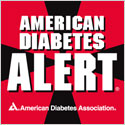|
Last Modified: March 26, 2008
Last Reviewed: March 26, 2008
Content Source:
Office of Minority Health & Health Disparities (OMHD) |
 |
Highlights in Minority Health
March, 2008

|
AMERICAN DIABETES ALERT
DAY IS TUESDAY, MARCH 25th, 2008! |
|
The American Diabetes Alert Day is a one-day, "wake-up" call to inform
the American public about the seriousness of diabetes. Observed on
the fourth Tuesday of every March, the 20th annual American Diabetes
Alert Day is Tuesday, March 25th, 2008.1 |
|
Diabetes mellitus is a group of diseases characterized by high levels
of blood glucose resulting from defects in insulin production,
insulin action, or both. Diabetes can be associated with
serious complications and premature death, but people with diabetes
can take steps to control the disease and lower the risk of
complications.2 |
|
On Diabetes Alert Day, the American Diabetes Association will "Sound
the Alert" about the dangers of diabetes. People are
encouraged to take the Diabetes Risk Test. The risk test
requires users to answer seven simple questions about weight, age,
lifestyle and family history -- all potential risk factors for
diabetes. People scoring 10 points or more are at a high
risk for type 2 diabetes and are encouraged to see a health care
professional for further evaluation.1 |
|
Trends show that minority populations are disproportionately
affected by diabetes: |
 |
Compared to whites, African Americans are more than twice as likely
to have diabetes.3 |
 |
From 1997 through 2005, the age-adjusted prevalence among Hispanics
increased 16% among males and 21% among females.3 |
 |
Among people younger than 20, American Indians aged 10-19 have the
highest prevalence of type 2 diabetes.3 |
|
|
|
Although more than 20.8 million Americans have diabetes, 6.2 million
do not know they have the disease.4
Understanding risk factors and early detection can help to reduce
the burden of diabetes in minority populations. |
|
|


